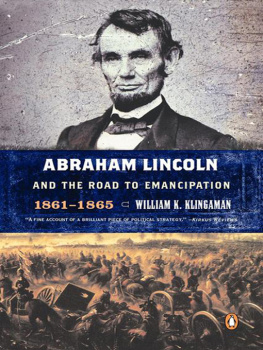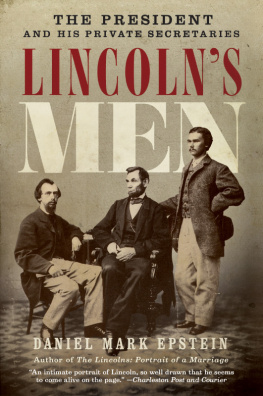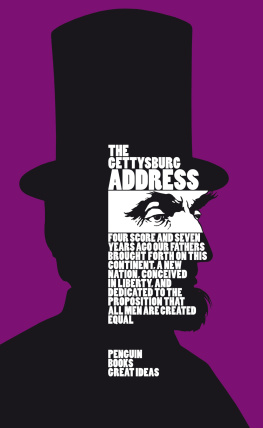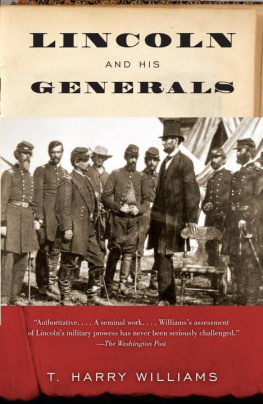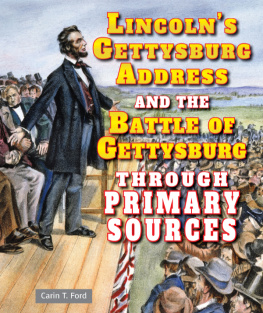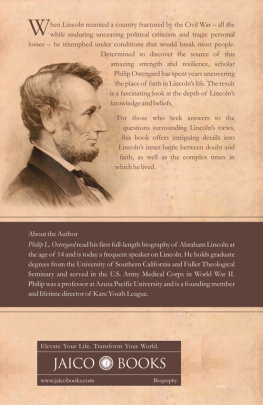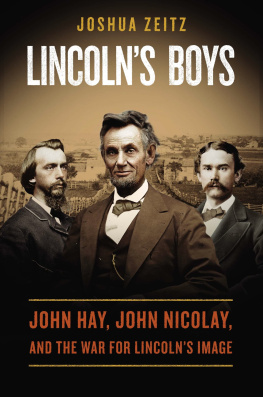Published by The History Press
Charleston, SC
www.historypress.com
Copyright 2020 by John W. Schildt
Originally printed 2010. The History Press edition 2020.
All rights reserved
Cover images courtesy of the Library of Congress.
First published 2020
e-book edition 2020
ISBN 978.1.43967.039.2
Library of Congress Control Number: 2020932099
print edition ISBN 978.1.46714.571.8
Notice: The information in this book is true and complete to the best of our knowledge. It is offered without guarantee on the part of the author or The History Press. The author and The History Press disclaim all liability in connection with the use of this book.
All rights reserved. No part of this book may be reproduced or transmitted in any form whatsoever without prior written permission from the publisher except in the case of brief quotations embodied in critical articles and reviews.
To Miss Edith Nicodemus, the first-grade teacher at Walkersville Elementary School, who initially told me about Mr. Lincoln. Also, to Judge Edward S. Delaplaine, a writer and historian who befriended and encouraged the author.
CONTENTS
ACKNOWLEDGEMENTS
With gratitude to Miss Edith Nicodemus, a first-grade teacher who awakened a love of Mr. Lincoln;
Judge Edward S. Delaplaine, a Lincoln scholar who was a source of constant encouragement;
John Frye, a walking encyclopedia of knowledge about the roads and countryside in southern Washington County;
Dennis Frye, author, historian, preservationist and friend who shared his knowledge on the Showman farms, the headquarters of Ambrose Burnside and George B. McClellan at Antietam;
John Hennessy, author and historian who furnished a wealth of material about Lincolns visit to the Army of the Potomac in the spring of 1863;
Edward Itnrye, a gentleman who discovered Lincolns route from Antietam to Frederick;
Colonel Jerry Meyers, who took photos and did research for me on Aquia Creek;
Frank OReilly, historian and author who shared information on the Fredericksburg area;
Alann Schmidt, ranger historian at Antietam who provided archival assistance;
Ted Alexander, formerly chief historian at Antietam, who asked the writer to give a lecture on Lincolns travels for one of his seminarsthe lecture led to the book;
Chris Vincent, chief guide at Antietam, and fellow guides Jim Buchanan and Bill Sagle for their assistance with the images;
And Kate Jenkins of The History Press for her expertise and guidance in bringing this work to fruition.
To all of these, we say, Thank you! Without your assistance, this work could not have been accomplished.
INTRODUCTION
On a February morning, a group of first graders at Walkersville Elementary School waited for class to begin. It was Abraham Lincolns birthday.
When class began, Miss Edith Nicodemus, the teacher, had many objects to share with us. There was a miniature log cabin, a small fence rail and a picture of Lincoln stretched out before the fireplace reading the Bible, as well as various other pictures of Lincoln. Her presentation awakened a spark in mean interest in people and places, as well as in Mr. Lincoln. Miss Edith also gave each of us a shiny new penny. I still have mine.
Early in my teenage years, I timidly approached one of Marylands foremost historians and writers, the Honorable Edward S. Delaplaine, a prominent jurist. Judge Delaplaine had written on Francis Scott Key, John Philip Sousa and a host of other subjects. He also gave me a copy of Fighting for Time, the story of the Battle of Monocacy. Judge Glenn S. Worthington was one of his contemporaries. Judge Delaplaine had also completed what I believe to be the first work on Lincolns visit to Antietam, in a brief called Lincoln and His Traveling Companions to Antietam.
Judge Delaplaine gladly shared his research and constantly befriended and encouraged the author. It is for this reason this book is dedicated to Miss Edith and to Judge Delaplaine. They lit the spark, and to them I shall be eternally grateful.
A TRAVELING MAN
Today, the President of the United States travels long distances on Air Force One. For short journeys, he flies on a Marine Corps helicopter. The President travels first class, with bulletproof limousines for ground travel. Advance people check out security, and in parades or other gatherings, members of the Secret Service are everywhere. Such was not the case during the years between 1861 and 1865, when Abraham Lincoln was the sixteenth President of the United States.
As a boy, Lincoln traveled on foot, horseback, flatboat and Conestoga wagon. As a lawyer, he rode his Illinois judicial circuit traveling by horseback. To the end of his life, he knew and admired good horses.
Today, jet travel is the primary method of transportation. In the day of Mr. Lincoln, the train was king. One of the great moments of Lincolns life occurred on February 11, 1861, as he prepared to leave his Springfield home for Washington. He walked out the door of his home and closed it, never to return. And as his friends and neighbors gathered in the rain, Mr. Lincoln bade them farewell.
The cold drizzle brought numbness to Lincoln and his party of fifteen as they approached the Great Western Station. The gray mist of the dawn seemed more indicative of twilight. The locomotive was already puffing steam. Behind the engine were a baggage car and a special passenger car. The president and the superintendent of the Great Western were awaiting Mr. Lincoln. One thousand people had gathered at the little brick station to see Mr. Lincoln off.
A path was cleared from the station to the car. As Lincoln walked among them, hands were stretched out for one last touch from one of their own.
Apparently, he had not intended to make a speech. Mr. Lincoln did not like to make impromptu speeches. He always wanted to be prepared and have some notes. But as he reached the platform of the car, he took off his hat. He looked out over the crowd. He saw his friends and neighbors of many years. His heart was filled with great emotion. He looked almost like he was standing by a grave site. The members of the crowd took off their hats, almost as if in salute. Then Mr. Lincoln spoke:
Friends, no one who has never been placed in a like position can understand my feelings at this hour nor the impressive sadness I feel at this parting. For more than a quarter of a century I have lived among you, and during all that time I have received nothing but kindness at your hands. Here I have lived from my youth till now I am an old man. Here the most sacred trusts of earth were assumed; here all my children were born and one of them lies buried. To you, dear friends, I owe all that I have, all that I am. All the strange checkered past seems to crowd now upon my mind. Today I leave you; I go to assume a task more difficult than that which devolved upon General Washington. Unless the great God who assisted him shall be with and aid me, I must fail. But if the same omniscient mind and the same Almighty arm that directed and protected him shall guide and support me, I shall not fail; I shall succeed. Let us all pray that the God of our fathers may not forsake us now. To Him I commend you all. Permit me to ask that with equal sincerity and faith you will all invoke His wisdom and guidance for me. With these few words I must leave youfor how long I know not. Friends, one and all, I must now bid you an affectionate farewell.


